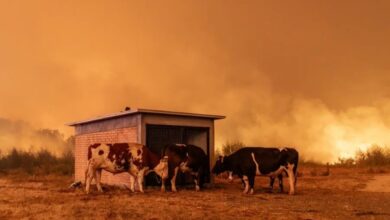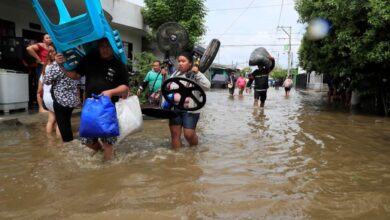Fires in Chile, Monocultures and Resilience: What Challenges Lie Ahead?
The fires in Chile are being controlled little by little, although the state of emergency remains. They certainly leave lessons for land use planning and the need to build resilience.

Photo: Pixabay
LatinAmerican Post | María Fernanda Ramírez Ramos
Listen to this article
Leer en español: Incendios en Chile, monocultivos y resiliencia: ¿Qué desafíos vienen para el futuro?
Uncontrolled fires have southern Chile burning. Thousands of families have had to leave their homes and flee to take shelter from the fire. Likewise, thousands of species of fauna and flora are being affected. Thus, the fires are leaving a high social, environmental and economic cost. A ccording to the latest balance delivered by the National Disaster Prevention and Response Service (Senapred), belonging to the Ministry of the Interior, the fire has left 25 people dead and 1,500 houses burned. On the other hand, it has been confirmed that 425,000 hectares of land have been burned, including forests and cultivated areas. The last reported death was that of Félix Pérez, a brigade member who was working to contain the fires and suffered an accident.
Around 300 fires remain active, with at least 60 of them in combat, according to the Undersecretary of the Interior, Manuel Monsalve in public statements. However, this is a figure that is constantly changing, as it is a phenomenon that is fought every day and that can be unpredictable. “The emergency is not over. The risk conditions are going to be maintained”, said Monsalve.
In fact, Camila Vallejo Dowling, general secretary and government spokesperson, said at a press conference that it is estimated that the fires will be fully controlled by the first half of March. In other words, the fight to put out the fires still has a long way to go. However, various international aids have arrived in the country, with human and technical resources. The Chilean government is making a constant report and has activated a recovery plan, with 13 points, to address the situation. The plan contemplates giving a recovery bond to 1,742 affected families, assigning temporary housing and caring for the animals. And although at this time the priority is to control the fires and care for those affected, it is necessary to plan for the future. On the other hand, climate change is a factor that plays against it and that is causing this type of situation to be replicated throughout the world with greater frequency and magnitude.
We recommend you read: Earthquake in Syria: the tragedy that does not end
The Problem of Monocultures and the Economic Model
Various investigations have shown that monocultures are related to greater environmental risks. Especially when there is no correct planning and the planted species are introduced from other areas, causing damage to the soil, or when native forests are felled to plant food such as soybeans, avocados or wheat. In short, it causes an imbalance in the ecosystems. If we add to this the fact that climate change is causing large tracts of land to become desertified, there is an unfavorable result for preventing and dealing with phenomena such as fires.
To this we can add that populations and governments do not adapt as quickly as they should to these environmental challenges. In addition, economic factors tend to be prioritized over social issues, sustainability or environmental responsibility. The Chilean investigative outlet Ciper published an opinion column by Juana Palma, President of the Association of Forest Engineers for the Native Forest, and Andrés Meza, vice president of the same institution. The experts analyze the reasons and situation of the fires and talk about the need to change the focus of forest management. Although they point out that crops are positive and necessary, they point out that monocultures are not usually well managed, which favor the type of situations such as those experienced today with fires. "The conclusions about the impact of forest monocultures could be totally different if there were the capacity to promote and regulate the integral management of territories and their resources under a prism of sustainable management of timber or non-timber resources , respecting at the same time the basic needs of the local population, conserving biological diversity, native forests, soils, water and recovering those sites or ecosystems affected by degradation".
Alejandro Miranda, a researcher at the Center for Climate and Resilience Science (CR2) and the Forest Landscape Ecology Laboratory of the Universidad de la Frontera, agrees that extensive crop areas, in this case trees for timber, are a factor that Chile must control. "Extensive forest plantations generate homogeneous landscapes, with a high fuel load and with species (such as pine and eucalyptus) that in their evolutionary development have adapted to fire, even allowing them to regenerate quickly after a fire", he said in an interview for Mongabay.
Without a doubt, what is happening in Chile, which joins a series of very strong fires that countries like Spain, the United States, Australia and Brazil have experienced, sets off alarm bells about the need to speed up adaptation and mitigation plans in the face of climate change. Likewise, it highlights the importance of developing capacities in communities to deal with these situations and the need to have resilience strategies in the face of changes. This includes reviewing agricultural and land use patterns for safe and sustainable long-term planning.





